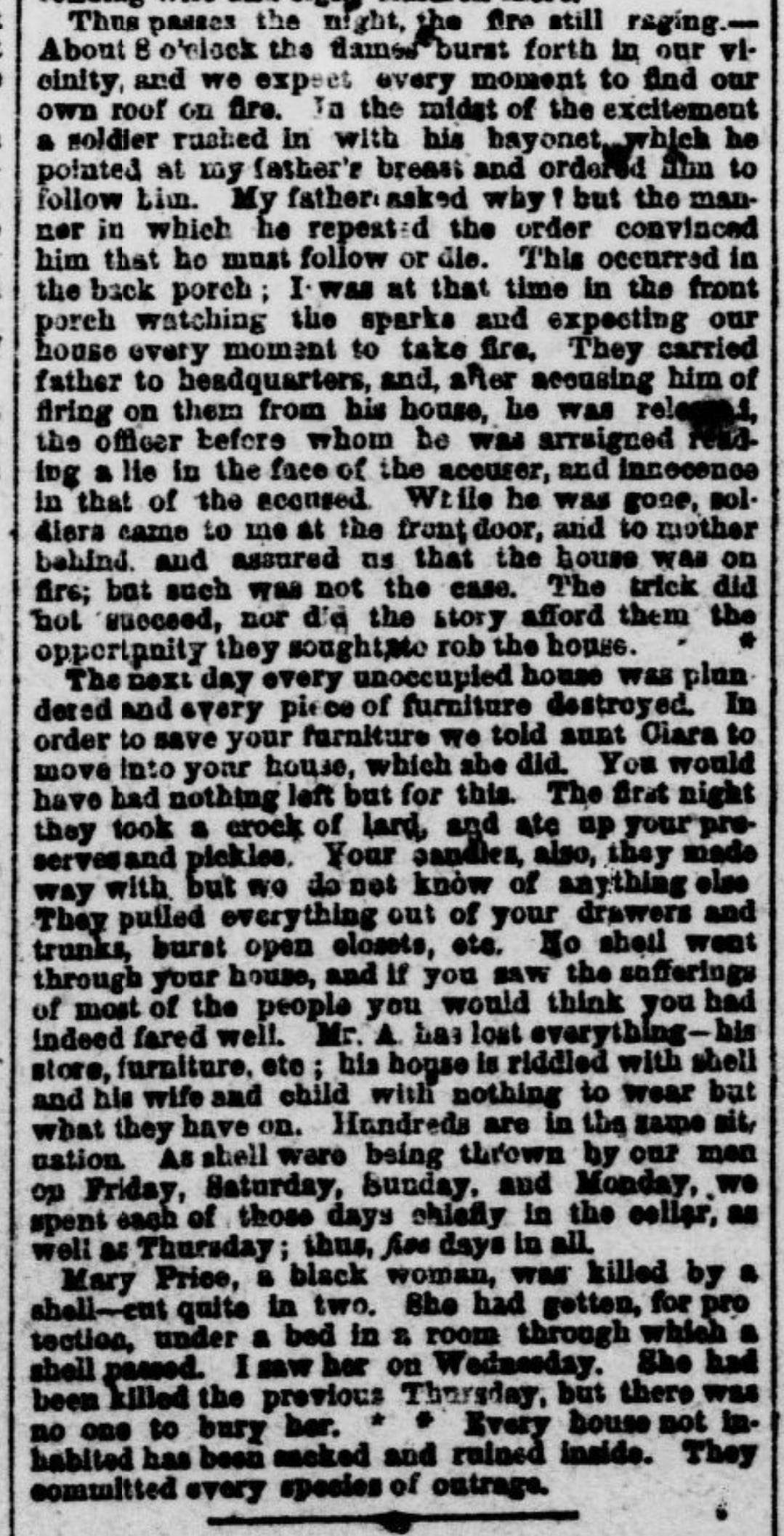Fredericksburg VA Civilians of all Races Suffered Abuse, Arson, Looting, and Death at the Hands of US Military in 1862
A firsthand account reported in the Richmond Daily Dispatch, January 2nd 1863.

Horrors of a Bombardment
The following are some extracts from a private letter of a young lady, who remained in Fredericksburg during the late bombardment, to a neighbor, at present sojourning as a refugee in Lynchburg. They possess deep interest for our readers:
On Thursday, December 11th, we were awakened by two cannon. At 5 o'clock we arose and dressed. About six the firing began in earnest. — We packed our trunks amid it all, made a fire in the cellar, and thither repaired. We had not been there an hour when a shell went through our attic room, breaking bedsteads, etc. One shot went through the parlor; five in all through the house. As they passed, the crash they made seemed to threaten instant death to all; it sounded as though the house were tumbling in, and would bury us in its ruins. We knew the danger, but our trust was in God, and we were calm. Aunt Clara (the colored woman who lives opposite) was with us. Darkness came on, and the cannonading ceased, B. went to the gate and returned with the news that there was fire in different parts of the town, and that a company of our men were at the corner being on the pontoon bridge. Though the bombardment had ceased, the musketry sounded to my ears yet more awful, for I knew they were fighting in the streets. My ears are suddenly shocked by a shout of demoniacal glee— "Here are the rebels! here are the d—d rebels! fire, boys! fire!" Two dreadful cries rend the air — our gallant Capt. Cook is killed at our corner. — To hear the fiendish cry of the enemy unnerved me more than the explosion of the thousands of shell that burst around us.
All being now quiet for a time, we lie down, but not to sleep; for, hark! they are breaking into houses like so many demons. With terrible force they throw themselves against our doors, back and front, but an officer (Yankee, though he was.) saved us. We hear them break into your house, but dare not utter a word, lest they slay us. Oh! who can tell the horrors of that night? They order my father out, declare that he has wine in his cellar, &c. He assures them he has only his unoffending wife and eight children there.
Thus passes the night, the fire still raging. — About 8 o'clock the flames burst forth in our vicinity, and we expect every moment to find our own roof on fire. In the midst of the excitement a soldier rushed in with his bayonet, which he pointed at my father's breast and ordered him to follow him. My father asked why? but the manner in which he repeated the order convinced him that he must follow or die. This occurred in the back porch; I was at that time in the front porch watching the sparks and expecting our house every moment to take fire. They carried father to headquarters, and, after accusing him of firing on them from his house, he was released, the officer before whom he was arraigned reading a lie in the face of the accuser, and innocence in that of the accused. While he was gone, soldiers came to me at the front door, and to mother behind, and assured us that the house was on fire; but such was not the case. The trick did not succeed, nor did the story afford them the opportunity they sought to rob the house.
The next day every unoccupied house was plundered and every piece of furniture destroyed. In order to save your furniture we told aunt Clara to move into your house, which she did. You would have had nothing left but for this. The first night they took a crock of lard, and ate up your preserves and pickles. Your candles, also, they made way with but we do not know of anything else. They pulled everything out of your drawers and trunks, burst open closets, etc. No shell went through your house, and if you saw the sufferings of most of the people you would think you had indeed fared well. Mr. A. has lost everything — his store, furniture, etc; his house is riddled with shell and his wife and child with nothing to wear but what they have on. Hundreds are in the same situation. As shell were being thrown by our men on Friday, Saturday, Sunday, and Monday, we spent each of those days chiefly in the cellar, as well as Thursday; thus, five days in all.
Mary Price, a black woman, was killed by a shell — cut quite in two. She had gotten, for protection, under a bed in a room through which a shell passed. I saw her on Wednesday. She had been killed the previous Thursday, but there was no one to bury her. Every house not inhabited has been sacked and ruined inside. They committed every species of outrage.





